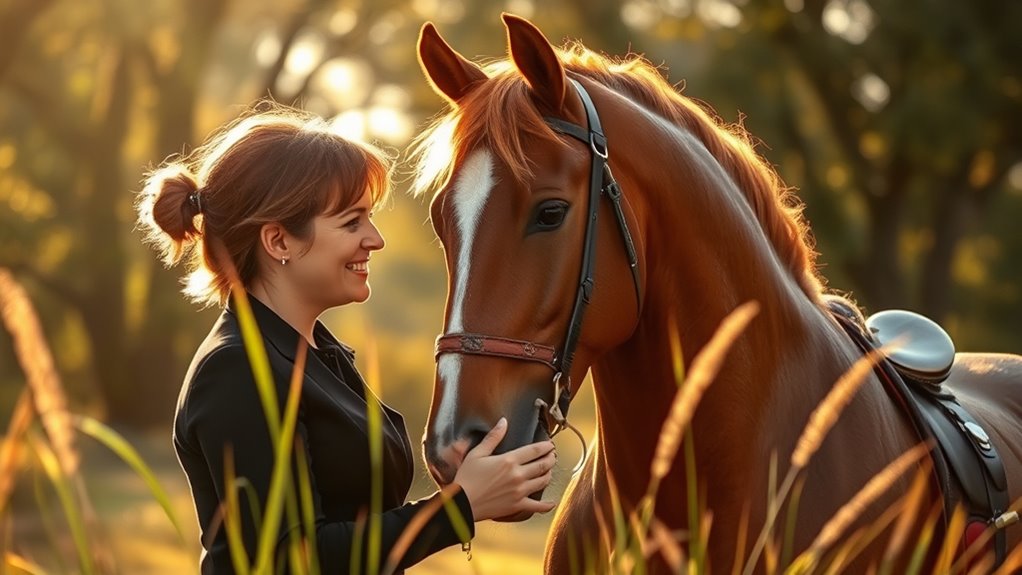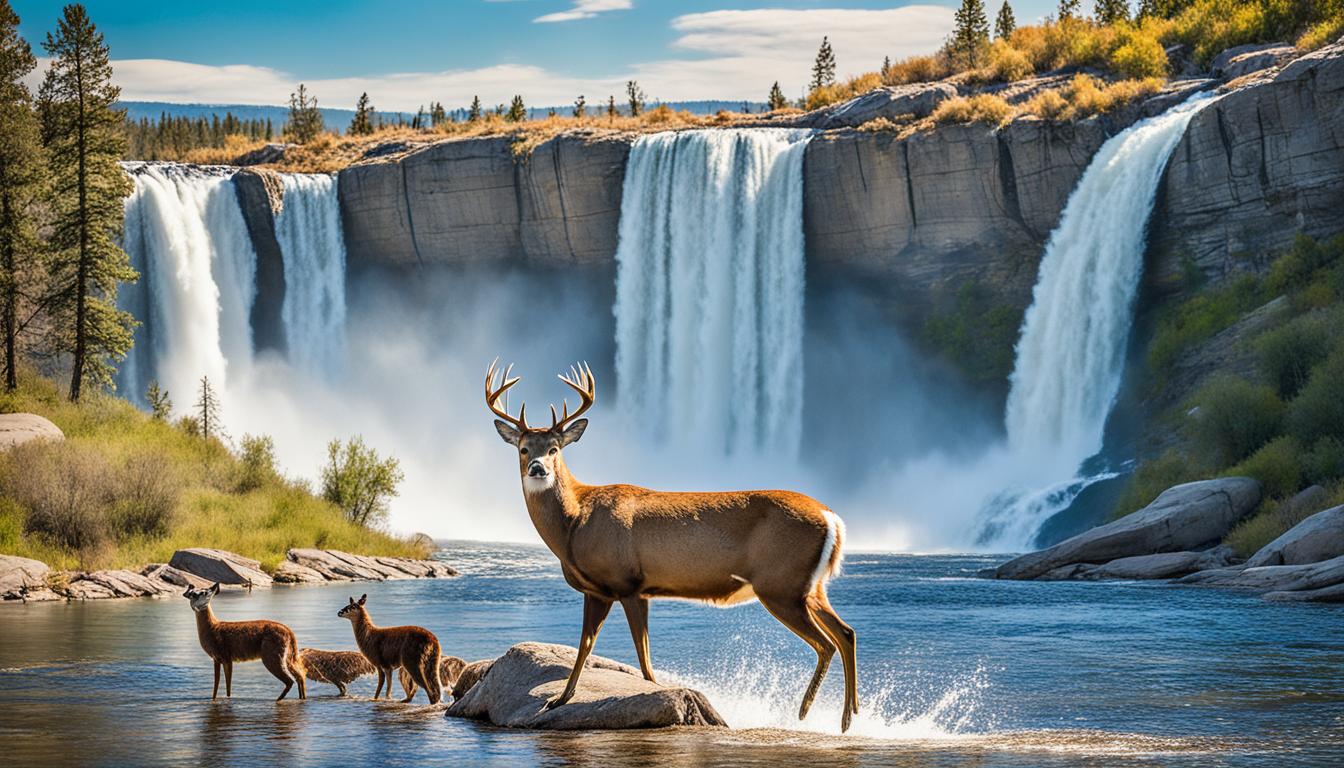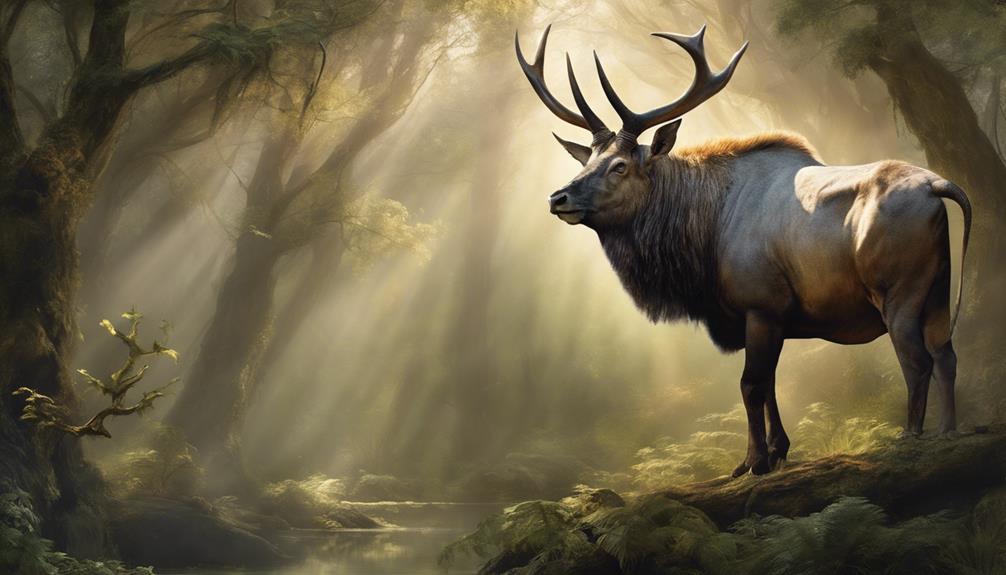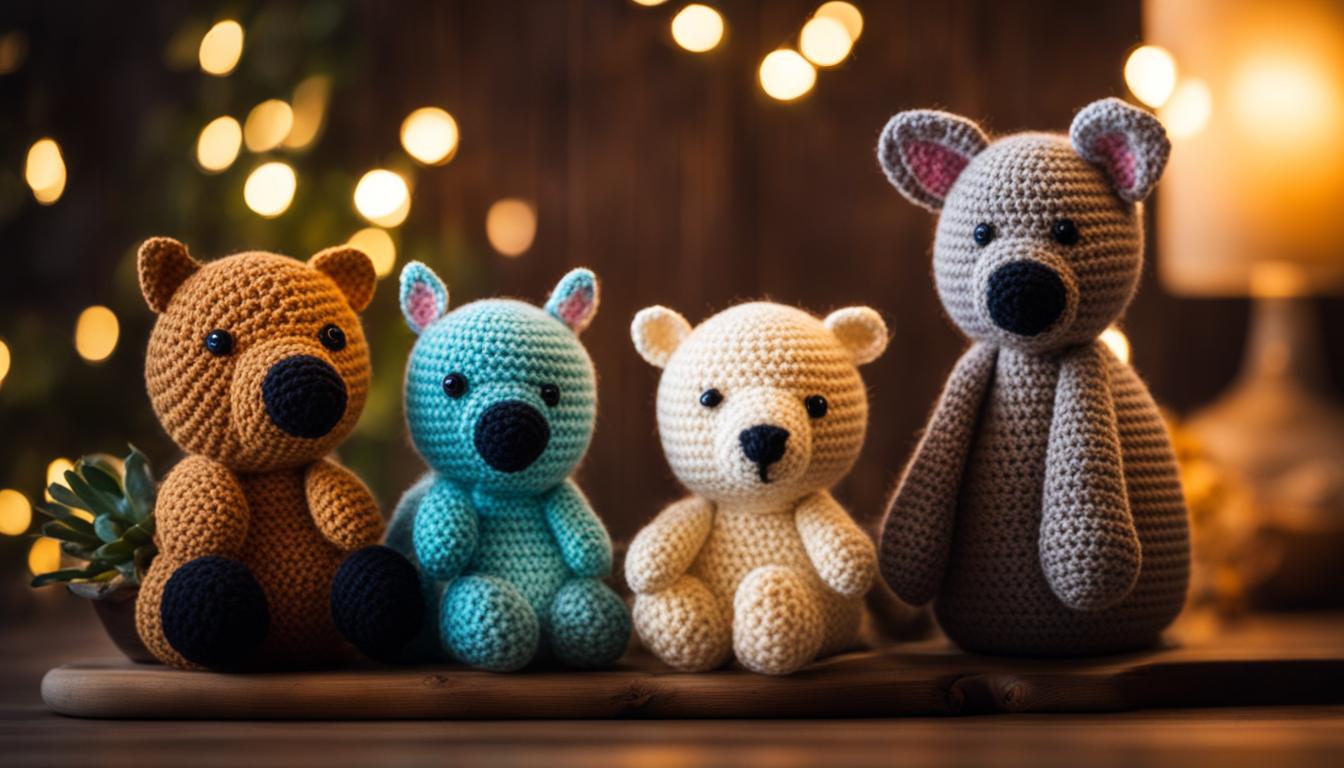The bond between you and horses is truly special, built on trust, communication, and shared emotions. These remarkable animals seek connection with you, thriving on positive interactions. By understanding their body language and responding to their emotions, you can strengthen your relationship. However, negative experiences can create distrust. Discover the rich history of human-horse partnerships and explore how these connections enrich both your lives. There's so much more to uncover about this incredible bond.
Key Takeaways
- Horses form complex emotional bonds with humans, characterized by trust, respect, and mutual understanding.
- Positive interactions, such as grooming and spending quality time, enhance emotional connections and trust.
- Horses can recognize and remember humans, showcasing the depth of their emotional ties.
- Negative experiences and inconsistent nurturing can significantly undermine trust between horses and humans.
- Historical partnerships have shaped civilizations, highlighting the mutual need for companionship between horses and humans.
The Complexity of Human-Horse Relationships
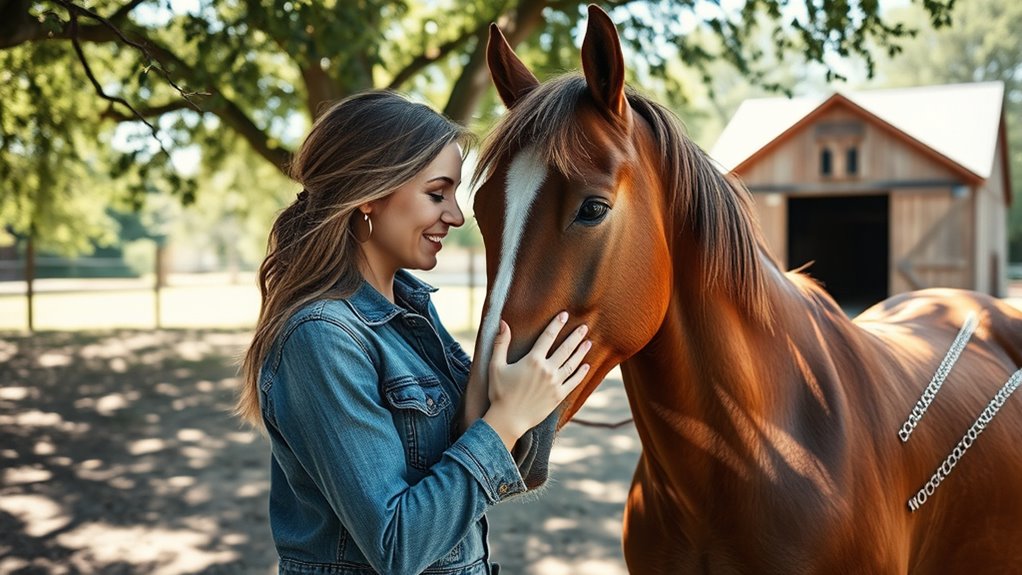
While many might see horses merely as companions or working animals, the reality is that the bond you can form with them is incredibly complex and deeply emotional. This connection with humans goes beyond simple affection; horses can recognize your emotions and respond accordingly.
Trust and mutual respect are essential, as consistent positive interactions foster strong emotional bonds. Remember, horses are social animals that thrive in groups, often looking for a leader.
They'll remember past experiences, reacting positively to joy and negatively to anger. By investing time to understand their body language, you'll enhance your bond between horses, creating a trusting relationship that benefits both you and your equine companion.
Positive Emotions and Bonding

When you engage positively with a horse, you lay the groundwork for a profound emotional bond. Horses are incredibly perceptive, able to read your emotions and respond accordingly.
By nurturing this relationship, you can experience remarkable benefits:
- Horses often show affection through nuzzling and following, strengthening your bond.
- Spending quality time grooming promotes trust and emotional well-being for both of you.
- Positive interactions can reduce stress and improve heart rates for both humans and horses.
- Horses remember and recognize you, demonstrating the depth of your connection over time.
Factors Leading to Distrust
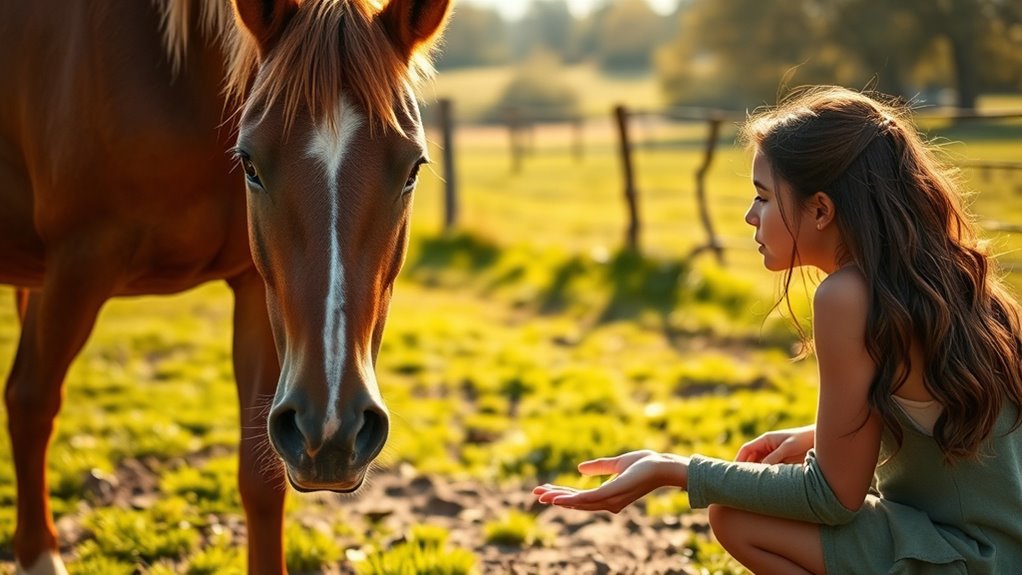
Building a strong bond with your horse can be incredibly rewarding, but it's important to recognize that negative experiences can easily undermine that trust. Harsh treatment or painful reinforcements can lead to distrust, affecting how your horse perceives human interactions.
If you weren't consistent or nurturing during their early life, it might hinder the establishment of trust. Horses are also sensitive to your emotions; showing anger or fear can cause them to react negatively, reinforcing their distrust.
Furthermore, poor leadership choices—like inconsistent commands—can diminish their confidence in you. Remember, horses can remember past negative interactions, which may lead to long-lasting distrust if not addressed positively.
Being mindful of these factors is essential in maintaining a healthy horse-human relationship.
Building Trust and Communication

How can you foster a deeper bond with your horse? Building trust and effective communication are key. Start by engaging in positive interactions, as horses thrive on nurturing behaviors and confident leadership.
- Spend undemanding time together to spark curiosity and connection.
- Pay attention to your horse's body language for better understanding.
- Regular grooming promotes emotional well-being and strengthens your relationship.
- Maintain a calm demeanor; horses can sense your emotions and respond accordingly.
The Emotional Impact of Horses on Humans

The bond you create with your horse goes beyond trust and communication; it deeply influences your emotional well-being. Spending time with horses has a calming effect, physically altering your heart rate and reducing tension and anxiety.
As you pet your horse, you may notice an initial increase in their heart rate, which then decreases, reflecting the emotional bond you share. This connection can boost your self-esteem and confidence, as horses act as non-judgmental listeners, helping you express your feelings.
Additionally, their companionship alleviates loneliness, providing essential emotional support that fosters personal growth. Interacting with horses not only enhances your emotional state but also nurtures empathy and compassion, enriching the bond between you and these magnificent creatures.
Historical Perspective of Human-Horse Partnerships

The story of human-horse partnerships began over 5,000 years ago when horses were first domesticated in Central Asia.
As you explore their roles in society, you'll see how horses transformed transportation, agriculture, and warfare, shaping civilizations along the way.
This rich history underscores the cultural significance of horses and the deep connections forged between humans and these magnificent animals.
Origins of Equine Domestication
As humans began to explore the vast steppes of Central Asia around 4000-3500 BCE, they stumbled upon a remarkable companion in the horse. Initially, you might've used horses for meat and milk, but soon realized their incredible potential as riding and draft animals.
This relationship transformed human civilization in various ways:
- Revolutionized warfare and military strategies
- Enhanced agricultural practices and productivity
- Expanded trade routes and communication
- Fostered the development of new social structures
Archaeological evidence, like horse remains and artifacts, highlights the beginnings of riding and chariot pulling, particularly in the Botai culture of Kazakhstan.
Over time, the bond between humans and horses deepened, leading to companionship and the establishment of specialized breeds for different tasks.
Roles in Human Society
Throughout history, humans have relied on horses not just for labor but as essential partners in shaping societies. The bond between a horse and humans has been pivotal in various domains, including agriculture, transportation, and warfare. Horses facilitated trade and communication, expanding human reach across vast distances.
| Roles in Society | Impact |
|---|---|
| Agriculture | Increased food production |
| Transportation | Enhanced trade and mobility |
| Warfare | Transformed military strategies |
This partnership allowed you to cultivate larger areas and adapt military tactics, ultimately enriching your cultural practices. As the bond deepened, horses evolved from mere tools to beloved companions, enhancing the emotional well-being of both species.
Cultural Significance Over Time
While humans have relied on horses for various practical purposes over the centuries, their cultural significance extends far beyond mere utility.
Horses can create a strong bond that has shaped societies and influenced personal identities.
- They played an essential role in the rise of early civilizations.
- Domestication enabled the expansion of trade and cultural exchanges.
- Horses symbolize strength and nobility in art and folklore.
- Emotional connections between humans and horses have evolved over time.
As you explore this historical perspective, you'll see how these majestic animals haven't only transformed human endeavors but also enriched our cultural narratives, making them enduring symbols of companionship and resilience.
Shared Traits and Mutual Understanding

When you spend time with a horse, you might notice how they mirror your emotions, creating a unique bond.
Both of you communicate through body language, allowing for a deeper understanding of each other's needs.
This emotional resonance enhances your connection, making every interaction more meaningful.
Emotional Resonance Between Species
As you observe the bond between humans and horses, it becomes clear that emotional resonance plays an essential role in their connection. This strong relationship stems from their ability to understand and respond to each other's emotions.
- Horses can differentiate between anger and happiness through your facial expressions.
- They form deep emotional bonds, often showing affection by nuzzling or following you.
- Their emotional intelligence allows them to communicate feelings using body language and vocalizations.
- Both species thrive on social interaction, mirroring each other's need for companionship.
This mutual understanding and shared experiences not only enhance the bond but also promote overall well-being for both you and your equine partner.
Communication Through Body Language
The bond between humans and horses is further enriched through their unique communication styles, particularly via body language. Horses express their emotions using their ears, eyes, and sounds, while you can gauge their feelings by observing these subtle cues. By understanding this body language, you'll foster trust and connection. Notably, horses also read your emotions, reacting positively to smiles and negatively to frowns.
Here's a quick table to illustrate:
| Horse Behavior | Emotion Expressed | Human Response |
|---|---|---|
| Ears Forward | Curiosity | Engage positively |
| Ears Back | Fear or Discomfort | Approach calmly |
| Soft Eyes | Relaxation | Maintain calm demeanor |
| Tense Body | Anxiety | Speak softly |
| Whinnying | Excitement | Respond with enthusiasm |
Frequently Asked Questions
Do Humans and Horses Have a Symbiotic Relationship?
Yes, humans and horses do share a symbiotic relationship. You provide care, companionship, and support for horses, while they offer emotional connection, physical activity, and assistance in various tasks.
This mutual dependence creates a bond that enhances your well-being. When you interact positively with horses, you both benefit from increased trust and affection, leading to a deeper emotional connection that enriches your lives and fosters growth for both species.
What Is the Horse Human Connection?
Imagine standing in a sunlit pasture, the gentle whinny of a horse nearby.
The horse's warm breath brushes against your skin, creating an unspoken connection. This bond you share goes beyond mere companionship; it's built on trust, understanding, and emotional exchange.
You can sense its feelings, and it responds to yours. Together, you navigate the world, forging a relationship that enriches both your lives in ways words can't fully capture.
Why Do Humans Love Horses so Much?
You love horses because they resonate with your emotions and offer companionship. Their ability to sense your mood creates a unique connection, making you feel understood.
When they nuzzle you or follow closely, it deepens your affection for them. Their social nature mirrors your own desire for relationships, providing a sense of belonging.
Plus, spending time with horses often calms you, reducing stress and enhancing your overall well-being, reinforcing that special bond.
What Is the Relationship Between the Man and the Horse?
When you think about the relationship between a man and a horse, it's like a timeless dance, blending strength and grace.
You rely on the horse for companionship and assistance, while it looks to you for care and guidance.
This connection deepens through shared experiences and trust, as you both communicate in unspoken ways.
As you build this bond, you discover the joy and understanding that comes from working together harmoniously.
Conclusion
In the end, the bond between humans and horses is as deep as the roots of an ancient tree, intertwining lives and emotions. By nurturing trust and understanding, you can unveil a friendship that enriches both your life and your horse's. As you explore this unique relationship, remember that each interaction is a step toward deeper connection, revealing the profound impact these magnificent creatures have on our hearts and souls. Embrace the journey together.
